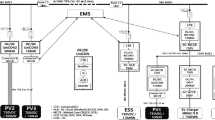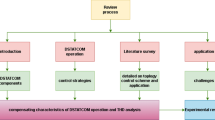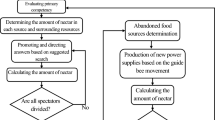Abstract
The use of Shunt Capacitor Banks (SCB) as a convenient compensation source of reactive power in distribution networks has an efficient role in enhancement voltage profile, correction of power factor and minimizing the network power losses. In this regard, this article investigates the enforcement of a modern robust and effective hybridization of Particle Swarm Optimization besides a Gravitational Search Algorithm (PSOGSA) as an optimization mechanism for solving the problem of optimum SCB allocation with minimizing the annual operating cost and enhancement of the system power quality. Moreover, a new Voltage-Loss-Cost Index (VLCI) has been associated with the proposed optimization technique as an efficient objective function to increase the voltage levels, minimize active power losses and the annual operating cost of the grid. Furthermore, the implemented methodology is introduced in two stages. Firstly, the most appropriate buses for locating SCB are estimated using Loss Sensitivity Factor (LSF). Then, the hybrid PSOGSA optimization algorithm is structured to detect the optimum sitings of SCB and their sizing from the elected buses based on VLCI as the main objective function. The suggested mechanism has been applied on 33-bus besides 69-bus IEEE radial distribution networks. In addition, it is applied on a practicality case study of 111-bus Moscow region radial distribution network. With a view to making certain of the validation of the suggested methodology, the acquired results have been compared with other mechanisms and techniques. The numerical results demonstrated that the suggested optimization technique has superiority with high performance to deduce the optimum decision of SCB allocation for minimizing the network power losses, enhancing the profile of voltage level, and maximizing the net savings as compared to other different techniques.
















Similar content being viewed by others
Abbreviations
- SCB :
-
Shunt Capacitor Banks
- N :
-
Number of branches
- P ij , Q ij :
-
The active and reactive power that inflow over line “N”
- \(P_{Lj}\), \(Q_{Lj}\) :
-
Active and reactive load that connected at node “j”
- ɛ t :
-
Epsilon tolerance “error” = 0.000001
- nb :
-
Number of buses
- i :
-
1: nb (no. of buses)
- \(P_{TLoss}\) :
-
Base total active power losses
- \(T_{h}\) :
-
The time in hour
- \(K_{e}\) :
-
The cost per kW h
- \(E_{TLoss}\) :
-
Base total active energy losses
- \(P_{SCB,TLoss}\) :
-
Total active power losses with SCB
- \(E_{SCB,TLoss}\) :
-
Total active energy losses with SCB
- \(P_{lineloss(ij)}\) :
-
The active power losses through branches
- \(\nu_{it}^{ti}\) :
-
The velocity of particle “it”
- ti :
-
Number of iteration
- \(M_{ak}\) :
-
The active gravitational mass
- \(\varepsilon\) :
-
A small constant of gravitational force in GSA
- \(R_{lk} (t)\) :
-
Euclidian distance between two agents’ l and k
- d :
-
Dimension of problem space
- \(M_{l}\) :
-
The mass of object l during time “t”
- w :
-
Random number within [0, 1]
- d :
-
Dimension of problem space
- \(\Delta Pl_{SCB}\) :
-
Power loss index
- \(\Delta V_{Dev}\) :
-
Voltage deviation index
- \(V_{1}\) :
-
Base per unit voltage
- TOC :
-
Total operating cost with SCB
- TOC base :
-
Base total operating cost without SCB
- \(K_{SCB}\) :
-
The cost per kVAr
- \(Q_{j}^{c}\) :
-
The value of reactive power installation at j bus (kVAr)
- \(K_{b}\) :
-
The number of compensated buses
- \(K_{f}\) :
-
The cost per installation
- \(\Delta OC\) :
-
Cost index (net operating cost)
- \(\lambda_{k}\) :
-
\(\lambda_{1}\), \(\lambda_{2}\), \(\lambda_{3}\) Parameter considered as weight factors of the proposed objective function
- \(P_{j,eff}\), \(Q_{j,eff}\) :
-
Total effective active and reactive power supplied beyond bus “j”
- \(LSF_{(ij)}\) :
-
Loss sensitivity factor
- VSF :
-
Voltage sensitivity factor
- c 1 and c 2 :
-
Weighting factors constants
- G(t):
-
Gravitational constant at time “t”
- \(M_{pl}\) :
-
Passive gravitational mass
- G O and α :
-
Initial value and descending coefficient respectively
- iter :
-
Current iteration
- maxitere :
-
Maximum number of iterations
- \(ac_{l} (t)\) :
-
Acceleration of all agents at time “t”
- r 1 , r 2 :
-
Two random numbers (variables) generated in the range [0, 1]
- r k :
-
Random number
References
Tulsky VN, Vanin AS, Tolba MA, Sharova AY, Zaki Diab AA (2016) Study and analysis of power quality for an electric power distribution system—case study: Moscow region. In: IEEE NW, Russia young researchers in electrical and electronic engineering conference (EIConRusNW), pp 710–716. https://doi.org/10.1109/eiconrusnw.2016.7448281
Yang HT, Huang YC, Huang CL (1995) Solution to capacitor placement problem in radial distribution system using tabu search method. In: IEEE international conference on energy management and power delivery, vol 1, pp 388–393
Prakash K, Sydulu M (2007) Particle swarm optimization based capacitor placement on radial distribution systems. In: IEEE power engineering society general meeting, pp 1–5
Swarup KS (2005) Genetic algorithm for optimal capacitor allocation in radial distribution systems. In: Proceedings of the 6th WSEAS international conference on evolutionary, Lisbon, Portugal, pp 152–159
Sarma AK, Rafi KM (2011) Optimal selection of capacitors for radial distribution systems using plant growth simulation algorithm. Int J Adv Sci Technol 30:43–54
Shuiab YM, Kalavathi MS, Rajan CC (2015) Optimal capacitor placement in radial distribution system using gravitational search algorithm. Electr Power Energy Syst 64:384–397
Abdelaziz AY, Ali ES, Abd Elazim SM (2016) Flower pollination algorithm and loss sensitivity factors for optimal sizing and placement of capacitors in radial distribution systems. Electr Power Energy Syst 78:207–214
Das D (2008) Optimal placement of capacitors in radial distribution system using a fuzzy-GA method. Electr Power Energy Syst 30(6–7):361–367
Hamouda A, Lakehal N, Zaher K (2010) Heuristic method for reactive energy management in distribution feeders. Energy Convers Manag 51(3):518–523
Raju MR, Ramachandra Murthy KVS, Ravindera K (2012) Direct search algorithm for capacitive compensation in radial distribution systems. Electr Power Energy Syst 42(1):24–30
Sultana S, Roy PK (2014) Optimal capacitor placement in radial distribution systems using teaching learning based optimization. Electr Power Energy Syst 54:387–398
Elfergany AA (2013) Optimal capacitor allocations using evolutionary algorithms. IET Proc Gener Transm Distrib 7(6):593–601. https://doi.org/10.1049/iet-gtd.2012.0661
Devabalaji KR, Yuvaraj T, Ravi K (2016) An efficient method for solving the optimal sitting and sizing problem of capacitor banks based on cuckoo search algorithm. Ain Shams Eng J 1–9. https://doi.org/10.1016/j.asej.2016.04.005
Ali ES, Abd Elazim SM, Abdelaziz AY (2016) Improved harmony algorithm and power loss index for optimal locations and sizing of capacitors in radial distribution systems. Electr Power Energy Syst 80:252–263
Duman S, Yorukeren N, Altas IH (2015) A novel modified hybrid PSOGSA based on fuzzy logic for non-convex economic dispatch problem with valve-point effect. Electr Power Energy Syst 64:121–135
Khadanga RK, Satapathy JK (2015) Unified power flow controller based damping controller design: a hybrid PSO-GSA approach. In: IEEE conference on the energy, power and environment: towards sustainable growth (ICEPE)
Sun S, Peng Q (2014) A hybrid PSO-GSA strategy for high-dimensional optimization and microarray data clustering. In: IEEE conference on the information and automation (ICIA)
Rashedi E, Nezamabadi S, Saryazdi S (2009) GSA: a gravitational search algorithm. Inf Sci 179(13):2232–2248
Mirjalili S, Hashim Siti ZM (2010) A new hybrid PSOGSA algorithm for function optimization. In: International conference on computer and information application (ICCIA 2010), IEEE
Tan WS, Hassan MY, Rhman HA, Abdullah MP, Hussin F (2013) Multi-distributed generation planning using hybrid particle swarm optimisation-gravitational search algorithm including voltage rise issue. IET Gener Transm Distrib J 7:929–942
Shirmohammadi D, Hong HW, Semlyen A, Lou GX (1988) A compensation-based power flow method for weakly meshed distribution and transmission networks. IEEE Trans Power Syst 3(2):753–762
Injeti SK, Thunuguntla VK, Shareef M (2015) Optimal allocation of capacitor banks in radial distribution systems for minimization of real power loss and maximization of network savings using bio-inspired optimization algorithms. Electr Power Energy Syst 69:441–455
Zaki Diab AA, Tulsky VN, Tolba MA (2016) Optimal shunt capacitors sitings and sizing in radial distribution systems using a novel hybrid optimization algorithm. In: Proceedings of MEPCON’2016, 27–29 Dec, Helwan University, Egypt. https://doi.org/10.1109/mepcon.2016.7836929
Eberhart RC, Kennedy J (1995) A new optimizer using particles swarm theory. In: Proceedings of the 6th international symposium on micro machine and human science, pp 39–43. https://doi.org/10.1109/mhs.1995.494215
Kennedy J, Eberhart RC (1995) Particle swarm optimization. In: Proceedings of the IEEE international conference on neural networks IV, Piscataway, NJ, IEEE Service Center, pp 1942–1948
Attia MA, Hasanien HM, Abdelaziz AY (2016) Performance enhancement of power systems with wave energy using gravitational search algorithm based TCSC devices. Eng Sci Technol Int J 19:1661–1667
MathWorks. http://www.mathworks.com
Baran ME, Wu FF (1989) Network reconfiguration in distribution systems for loss reduction and load balancing. IEEE Trans Power deliv 4:1401–1407
Baran ME, Wu FF (1989) Optimal capacitor placement on radial distribution systems. IEEE Trans Power Deliv 4(1):725–734
Author information
Authors and Affiliations
Corresponding author
Ethics declarations
Conflict of interest
The authors declare that they have no competing interests.
Rights and permissions
About this article
Cite this article
Tolba, M.A., Zaki Diab, A.A., Tulsky, V.N. et al. VLCI approach for optimal capacitors allocation in distribution networks based on hybrid PSOGSA optimization algorithm. Neural Comput & Applic 31, 3833–3850 (2019). https://doi.org/10.1007/s00521-017-3327-7
Received:
Accepted:
Published:
Issue Date:
DOI: https://doi.org/10.1007/s00521-017-3327-7




